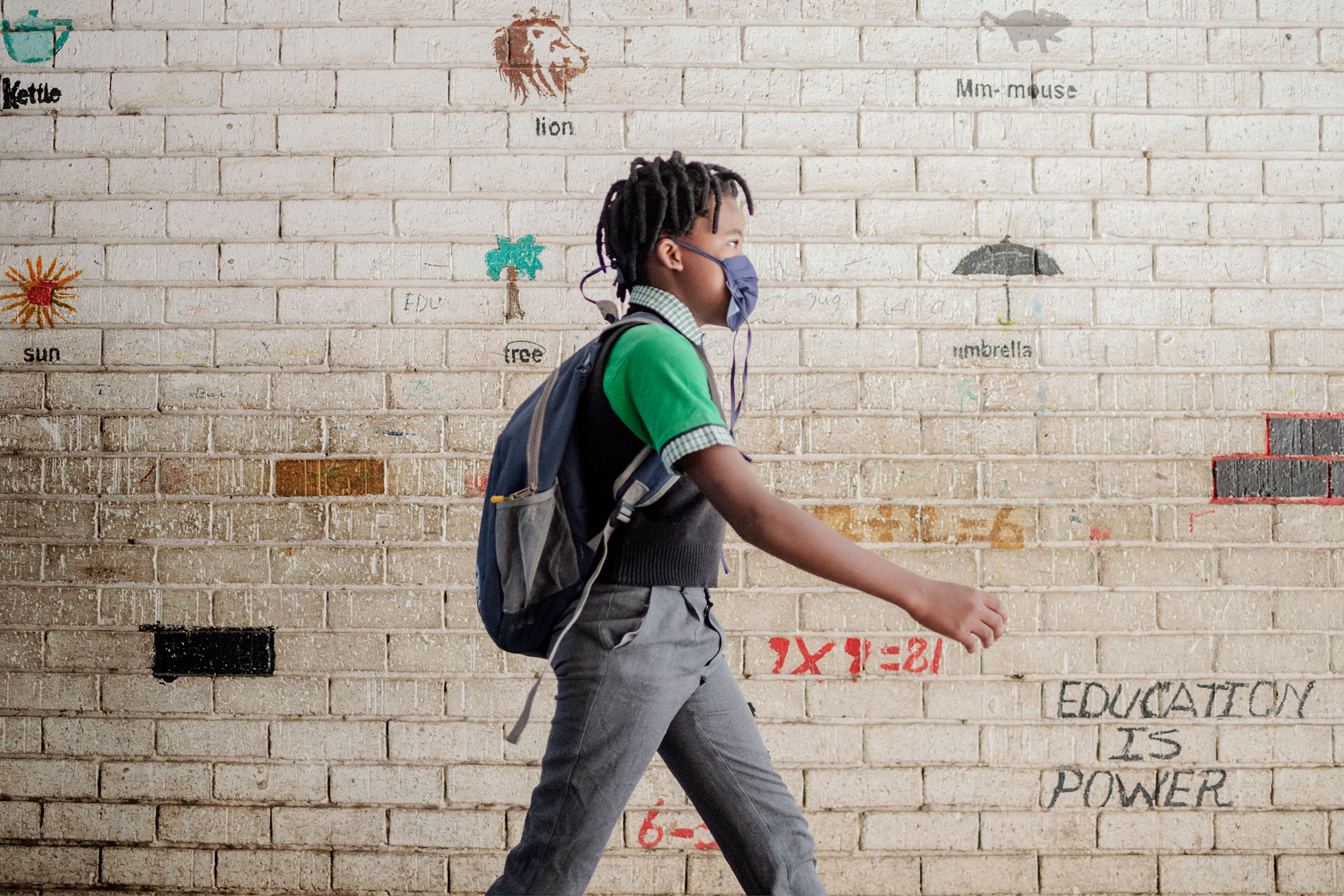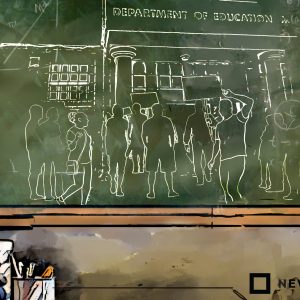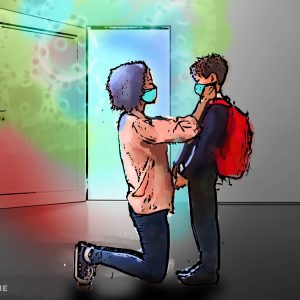School closures pose a big threat to learning gains
The pandemic meant children spent little time in the classroom in 2020, threatening proper development of numeracy and reading skills crucial to the foundation phase of a learner’s development.
Author:
20 April 2021

Last year’s school closures are likely to adversely affect young learners in their foundational phase, especially in reading and mathematics. South Africa already faces a literacy crisis, with some grade four learners unable to read for comprehension.
In many schools, pupils in the foundation phase learned very little of the school curriculum in 2020, says Lynn Bowie, the national coordinator at OLICO mathematics education, a non-governmental organisation that provides support to learners in maths.
“Learning to read is a crucial part of the foundation phase and a crucial basis for learning in all other subjects. Many learners will not have had the opportunity to do this in 2020,” Bowie says. “The lost teaching time, as well as the stop-start learning, with long gaps between the end of the school year in 2020 and the start of the school year in 2021, will have huge negative implications for the learning in the foundation phase.”
It will lead, she believes, to the widening of the gap between those in privileged education and those in impoverished communities.
Maths foundational skills lacking
A missed chance to learn maths in the foundation phase puts learners at a disadvantage as they move through grades. Even without the lost school time, learners did very badly in the 2019 Trends in International Mathematics and Science Study (TIMSS), in which South African pupils competed against learners from 64 countries. “The five lowest-performing countries were Morocco, Kuwait, South Africa, Pakistan and the Philippines,” said the Department of Basic Education.
“Learners performed better in items that required them to select a response (multiple choice questions) than in items where they had to write a response (constructed-responses). Learners were unable to write descriptions or explanations,” the department added.
The TIMSS results show that learners need to develop a strong foundational phase understanding of concepts in maths to help them solve problems confidently across grades. Access to resources is also crucial to support learners in developing early reading and writing skills, so they can respond to questions.
Related article:
Bowie believes a learner who does not develop a good number sense in early grades will struggle with maths throughout their schooling. “In the project I work in we see learners entering high school still using a unit counting type approach,” she says. “For example, these learners will do a calculation like six multiplied by four by drawing six lots of four ‘sticks’ and then counting them all up.”
Bowie is concerned that this failure to do basic calculation does not leave much “brain space” for a learner to grasp new concepts in class.
“One of the big difficulties will be that maths is a hierarchical subject. So, for example, learners need to have mastered single-digit addition before going on to multi-digit addition. This means, in the foundation phase, in particular, we cannot simply skip over some of the missed work from grade one and hope it will magically come right in grade two.”
Related article:
Addressing this learning gap, Bowie says, requires considerable effort, time for discussion and exploration, and regular practice.
“Learners also need time to work on a concept to grasp it fully as well as to become fluent in some of the basic math facts. It is thus going to be challenging to help learners … reach the required grade level,” she says.
Inequalities in learning time
In a country with a wide digital divide, contact learning is vital, especially for no-fee schools, which lack resources. Following the Covid-19 lockdowns, learning gaps are likely to be experienced by children from impoverished communities who have little or no access to digital learning. Parents in these communities also may lack the ability to support learning at home because of limited resources and skills.
Through her maths programmes, Bowie noticed that though remote learning is difficult for everyone, learners from economically disadvantaged communities are more adversely affected.
“In our experience of working with learners from these schools during lockdown [we realised that], although parents were eager to help learners continue learning, the cost of data, even for a basic WhatsApp package, was prohibitive,” she says. “Even in cases where learners could access some learning material over WhatsApp, for many learners, there was no quiet place without distractions to work at home.”
Related article:
Bulelani Futshane, the Western Cape provincial coordinator of Nal’ibali, a campaign that encourages children to read for enjoyment, says: “The impact of the Covid-19 plague has been devastating for the schools in the previously disadvantaged communities, where there are no online facilities. These communities are still very much dependent on face-to-face engagement.”
According to Bowie, these learners were more likely to be in schools with overcrowded classrooms before the pandemic and so, when schools went back, they would have had less time at school because of social distancing requirements.
Futshane says lost learning time could delay efforts to address the literacy crisis. “This does not help us combat the challenge of 78% of grade fours not [being] able to read for meaning.”
Trying to catch up on lost learning time pressurises children and teachers. Futshane believes this will shift the focus away from creating an enjoyable learning experience for children. “Children will continue to associate books with pressure and assessments,” he says.
Beyond Covid-19
Disruption to learning and teaching at schools will likely wipe out any learning gains the country may have made. Carol Nuga from the Department of Basic Education and Martin Gustafsson from the University of Stellenbosch write in a 2020 study: “Covid-19 can erode the learning gains made in schools over the last two decades. As the poor will be most affected, inequality in education could widen with social and economic implications in the long term.”
The pair fear that the pandemic threatens to undermine the progress seen in both national and international numeracy and literacy assessments. Households with impoverished and vulnerable learners have been most affected by the pandemic, warn Nuga and Gustafsson.
Related article:
“If support for learning in the foundation phase and catch-up programmes are not fast-tracked in the coming years, learning gains will be rolled back by at least four years in the primary grades and twice as long in the secondary grades of school. These losses threaten to be more for schools with learners with special education needs, and in schools with a weak culture of accountability for effective teaching and learning.”
In addressing learning losses, Bowie believes “teachers will need to work with considerable skill to get a sense of where their learners are at and to devise appropriate learning programmes that meet where they are at but also move them forward. For teachers with large classes, this will be particularly challenging.”The responsibility lies with the education department, Bowie says, to support teachers as they try to help learners at the foundation phase, but communities need to contribute too. “For example, if there is a young adult who could work with a small group of learners from their street? Can we provide older children with some fun maths games to play with their foundation phase siblings? Are there ways we can utilise community centres and libraries to provide extra support to learners when it is safe to do so? Are there options for using community radio stations to support learning at home?”




